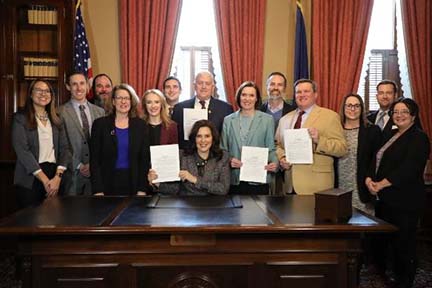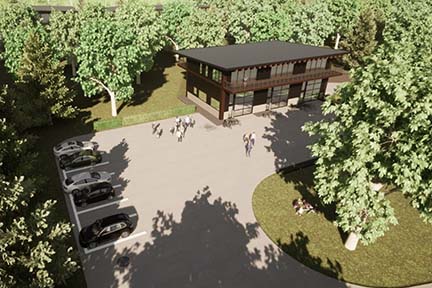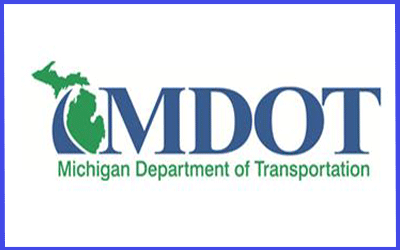
Gov. Whitmer Wins Major Economic Deals, Creating or Retaining 1,846 Jobs, Generating Over $1.2 Billion in Investments
LANSING, Mich. – Today, Governor Gretchen Whitmer joined the Michigan Economic Development Corporation to announce Michigan Strategic Fund approval of a wide range of projects, that, in total, will create or retain 1,846 jobs and generate more than $1.2 billion in investment in Michigan.
“Today’s approvals will help us continue to grow our economy and compete for every good-paying job,” said Governor Whitmer. “From Marquette to Monroe, we will expand leadership in future mobility, elevate our growing outdoor recreation industry, create good-paying jobs for Michiganders, and invest in our communities. When we come together to focus on the issues that matter, we can support businesses of all sizes, grow our economy, spur innovation, and move Michigan forward.”
“The projects approved today build on our statewide leadership in advanced and EV manufacturing, bring good jobs to Michigan residents, support vibrant communities, and help increase growth opportunities for businesses ranging from start-ups to established companies, and better prepare our state to compete for business attraction opportunities,” said Michigan Economic Development Corporation CEO and Michigan Strategic Fund President and Chair Quentin Messer Jr. “We are grateful to Governor Whitmer, legislators, and local officials for their continued support for our programs, and we appreciate the hard work of the Michigan Strategic Fund board. Today’s MSF actions demonstrate our ongoing commitment to ensuring our work is making an impact no matter where our friends and neighbors reside across Michigan.”
Projects include a transformational investment by Swedish paper producer Billerud in Escanaba; investments in Independence Township, Traverse City, Sterling Heights, and Auburn Hills that will build on Michigan’s leadership in electric vehicle manufacturing; community redevelopment projects in Monroe and Detroit; a new outdoor recreation innovation hub in Marquette; and actions that grow opportunities for Michigan’s small manufacturers and entrepreneurs.
Michigan Strategic Fund approves support for Escanaba Mill transformation; project to retain at least 1,240 jobs in the Upper Peninsula
Billerud U.S. Production Holding LLC is a subsidiary of Billerud, a leading paper and packaging provider headquartered in Sweden. The company has about 5,800 employees worldwide, with more than 1,200 employees in Michigan. Earlier this year, Billerud acquired Ohio-based Verso Corporation, a leading producer of coated paper in North America as part of its global strategy. The acquisition included Verso’s production operations in Escanaba and Quinnesec, Michigan, and Wisconsin Rapids, Wisconsin.
Billerud U.S. Production is analyzing whether to bring advanced technology and advanced manufacturing capability to its Escanaba operations, a project that is expected to generate a total capital investment of approximately $1 billion and retain at least 1,240 well-paying jobs in the region.
Billerud plans to transform its Escanaba operations to produce a more technologically advanced paper product known as paperboard or cartonboard. This multi-ply product is used as packaging for pharma and healthcare, cosmetics, drinks and others, and will allow the company to compete in a growth market for this product. The company’s investment into cutting-edge technology and advanced manufacturing capability will serve as a model of sustainable industrial development with significantly improved energy efficiency.
The Michigan Strategic Fund today approved a 15-year Forest Products Processing Renaissance Zone estimated to be worth $29.4 million in support of the project. In addition, Delta County, Escanaba Township and Wells Township anticipate authorization of a 15-year Renaissance Zone, and the townships anticipate approval of a 50-percent property tax abatement in support of the project.
As the company partners with its stakeholders on the company’s analysis, Michigan is the leading contender for this project. In addition to retaining well-paying jobs for Michiganders, the company’s investment will create a significantly bigger impact on the state’s overall economy than just the direct jobs being retained. Not only will the investment require that a large number of construction workers be employed for years on this transformation, bringing with them significant investment in the region, but the project will also include investments to improve the infrastructure around the mill.
“We thank the Michigan Strategic Fund board members for their recommendation that Billerud’s Escanaba Mill be designated as a Renaissance Zone. This designation is an important step forward in our plans to transform the mill into a world-class paperboard production facility,” said Billerud North America Deputy President and General Counsel Kevin Kuznicki. “Our pre-feasibility study is underway and expected to be completed in early 2023. We look forward to continuing to partner closely with our employees, unions, and local and state authorities over the next several months to finalize project and incentive details.”
“We are excited to see the Michigan Strategic Fund approve a Forest Products Processing Renaissance Zone for Billerud today, and are grateful not only to the Strategic Fund for its support but to Quentin Messer and his team at the MEDC for its hard, thoughtful work to ensure the availability of this tool for Billerud,” said InvestUP CEO Marty Fittante. “With the renaissance zone in place, it will permit Billerud and the state of Michigan to continue to work together to support this project in the Upper Peninsula and we look forward to continuing to be a partner to the company, the state and the community to secure this investment in our region.”
Lear Corporation expanding in Independence Township, Traverse City, Sterling Heights, building on state’s leadership in vehicle electrification
Lear Corporation, founded in Detroit in 1917 and headquartered in Southfield, is a global automotive technology leader in Seating and E-Systems. The company employs more than 160,000 people at 235 facilities in 38 countries, including 13 sites and about 3,800 team members in Michigan.
Lear is planning to manufacture highly technical, PACE Award-winning Battery Disconnect Units and other vehicle electrification sub-systems for advanced batteries that will be supplied to automakers. These highly complex components control power transfer from the vehicle’s battery to its electrical systems, allowing EVs to charge faster and driver farther while delivering the higher performance requirements needed to power SUVs and light-duty trucks.
Lear plans to utilize a facility in Independence Township to manufacture these components. In addition, the company plans to expand its current plant in Traverse City to manufacture components related to the EV battery pack and upgrade its Sterling Heights facility in order to increase production of the engineered plastics needed for the new components.
In total, the project is expected to generate a total capital investment of $112.5 million and create up to 500 jobs, supported by a $4.5 million Michigan Business Development Program performance-based grant. Michigan was chosen for the project over other competing sites.
The Michigan Strategic Fund also approved a 15-year, 100-percent State Essential Services Assessment exemption valued at $1.9 million in support of the project.
“Lear is proud to select Independence Township as the future home of an all-new production facility, and we thank the Michigan Economic Development Corp. for its support,” said Ray Scott, Lear President and CEO. “The plant is slated to start production in early 2024 and will provide battery disconnect units and other vehicle electrification technologies. As a Michigan-headquartered company, it’s important to make this investment in our backyard as we continue to grow our portfolio of products for electric vehicles.”
The project will bring immediate job growth and contributes to the MEDC’s ongoing efforts to strengthen Michigan’s leadership in mobility and vehicle electrification. Lear supports personal growth of its employees by providing significant training and offering career development. The company also employs the Together We Win program, which is designed to improve employee engagement, communication, and productivity through various initiatives.
“Lear Corporation is a longstanding and significant member of our regional manufacturing sector,” said Warren Call, president and CEO of Traverse Connect. “With the support of our community and the MEDC, this expansion will provide significant economic value to our regional economy and is an important next step in growing the segment of our workforce engaged in advanced and high-technology manufacturing.”
Both Traverse City and the Charter Township of Independence have pledged staff time and resources in support of the project. For information on careers with Lear Corporation, visit https://www.lear.com/careers.
“Lear Corporation’s expansion into Independence Township is great news on so many fronts. It’s a boost for Oakland County’s economy and the 500 people who will be hired for those good-paying jobs,” said Oakland County Executive Dave Coulter. “The Lear facility’s investment in the battery systems that will power electric vehicles also is further proof that Oakland County and the region are prime locations for advanced manufacturing that will help transform the automotive industry, protect the environment and ensure a cleaner and brighter future for generations.”
Safety science leader constructing testing facility in Auburn Hills, creating 61 high-wage jobs
UL LLC is a subsidiary of Underwriters Laboratories, Inc., a global leader in applied safety science headquartered in Northbrook, Ill. UL LLC, a part of UL Solutions, serves customers in testing, inspection, and advisory. UL Solutions employs more than 14,000 people worldwide, including approximately 90 Michigan residents.
UL LLC plans to purchase industrial zoned property in the city of Auburn Hills to build a testing facility, where it will focus on the company’s long-term strategy to support battery manufacturers by increasing the safety and reliability of its energy storage products. The project is expected to generate a total capital investment of $72.7 million and create 61 high-wage jobs, supported by a $1 million Michigan Business Development Program performance-based grant and a $500,000 Jobs Ready Michigan Program performance-based grant. The company chose Michigan for the project over competing sites in Indiana and Ohio because of the state’s deep auto manufacturing history.
“Companies like UL Solutions are paving the way for the future. We are honored that UL Solutions has chosen Auburn Hills for their next strategic investment. This new state-of-the-art facility will build on Auburn Hills’ reputation as a leader in the future of mobility and electrification,” said Auburn Hills Mayor Kevin R. McDaniel. “At nearly 130 years in business, we are thrilled to welcome this talented team to Auburn Hills and look forward to working with them on their continued success well into the future.”
UL LLC supports growth of its employees by offering hands-on experience working in the field with experienced, leadership staff, cross-training and promotion from within. The project contributes to the MEDC’s ongoing efforts to strengthen Michigan’s leadership in automotive manufacturing and will bring a new facility to Michigan, allowing the company to expand its Michigan presence and become a strong employer in the region.
The city of Auburn Hills anticipates approval of a property tax abatement in support of the project. The MSF also authorized an alternative State Essential Services Assessment exemption and the MEDC approved a State Education Tax abatement to be used in conjunction with the locally approved abatement.
“Companies up and down the supply chain are developing cutting-edge EV battery and mobility technology in the Detroit Region at a remarkable speed,” said Maureen Donohue Krauss, president and CEO of the Detroit Regional Partnership. “As EV technology gets increasingly complex so will regulations and safety standards. UL Solutions is going to help companies bring innovative battery and EV products to market safely and is a great addition to our world-class automotive and mobility testing grounds.”
New innovation hub in Marquette will focus on growing outdoor recreation, mobility industries
The Michigan Strategic Fund also approved a $3 million performance-based grant for Hoponassu OZ, LLC to develop Shop House Park Technology and Innovation Hub, an outdoor recreation and product innovation space situated between Northern Michigan University and the Lake Superior shore in Marquette. The project will include live-work-innovate space that will foster collaboration to grow the outdoor recreation and mobility industries.
The project is intended to solidify Michigan’s leadership position in mobility by connecting the state’s mobility sector to the outdoor recreation industry, drawing companies and teams from across the globe to create, develop, test and refine new technologies and vehicles that support activities like overlanding, off-roading, and van life, along with conventional outdoor recreation activities like hiking, biking and paddling. It is also expected to capitalize on private sector funding and capital as well as state and federal grant opportunities, and is expected to consolidate and focus talent in the region.
“David Ollila is a legend in the outdoor recreation industry, and I couldn’t be more excited to see him creating a place where Michigan can leverage the authentic Upper Peninsula outdoor experience while nurturing outdoor entrepreneurs and fostering collaboration with state’s full suite of design, innovation and production expertise,” said Brad Garmon, Executive Director of the Michigan Outdoor Recreation Industry Office. “This is a critical investment in a program and a place that Michigan needs in order to grab the attention of the national outdoor recreation industry and grow opportunities for the entire state.”
The development team will be led by owner/developer David Ollila. Project advisors include the Outdoor Recreation Industry Office, InvestUP, Michigan Technological University, the city of Marquette, MICHauto, 100k Ideas, and private consultant Michael Browne.
“By aligning its natural resources and assets with this economic moment, Michigan has a chance to lead the nation and establish the U.P. and Michigan as the center of excellence in outdoor recreation and mobility innovation,” said Hoponassu OZ, LLC Owner and Developer David Ollila. This is an opportunity to drive stronger connections between our peninsulas and provide the U.P. an asset that contributes to our collective economy In a way we have not done since Ford was operating plants in the U.P.”
The 1284 and 1248 N. Telegraph Rd. project will redevelop a nine-parcel brownfield site that was the former home of the La-Z-Boy headquarters in the city of Monroe. The total site is more than 17 acres and is owned by the city of Monroe, who is acting as developer of the project.
The city began proactively assembling this property for a mixed-use redevelopment in 2019 and has established a Telegraph Road Corridor Improvement Authority TIF district, adopting a development plan to implement a pedestrian-friendly setting and modernized design principles.
Monroe is actively engaged with two developers ready to implement the redevelopment plan that includes a national grocer as an anchor for the commercial space, with an expected total private investment of $60 million and the creation of 45 full-time equivalent jobs. The project will also create 100 jobs during the construction phase.
The City of Monroe Brownfield Redevelopment Authority today received Michigan Strategic Fund approval of $2.7 million in state tax capture for reimbursement of brownfield activities at the site. The city of Monroe has already completed eligible activities totaling $1.3 million and has committed to completing future eligible activity costs totaling $5.4 million.
The city of Monroe is also supporting the project with local tax capture valued at $3.8 million. The project will increase urban density and provide new housing options for Monroe area residents, as well as high-quality commercial space to attract business development. Completion of the project will bring additional investment and stabilization to the neighborhood and return an underutilized property to productive use.
“On behalf of the city of Monroe, I wish to express our gratitude to the Michigan Strategic Fund Board and the MEDC for their support of this crucial project. This site has a storied past weaved into the history of our community as it served as La-Z-Boy’s world headquarters since the company’s founding,” said city of Monroe Mayor Robert E. Clark. “Just as La-Z-Boy has turned the page to their next chapter in the company’s future with their new headquarters in Monroe, we are excited to witness how this site’s transformational redevelopment is setting a new bar for the future of the Telegraph Road corridor in our region. The success of this endeavor shows what benefit can come when the private sector and government work together for the betterment of the community.”
New mixed-use development will bring new vibrancy, economic activity to North End neighborhood of Detroit
The Beauton LLC will redevelop property into a three-story building in the North End neighborhood in Detroit. When completed, the project will include 29 units of multifamily housing and office space as well as public infrastructure improvements including new sidewalks along Beaubien and Horton Streets. Fifteen of the rental units will be restricted to rents between 50 and 80 percent of area median income.
The project is expected to generate a total capital investment of $7.1 million, supported by a $1.497 million Michigan Community Revitalization Program performance-based grant. The project is expected to bring new density to the neighborhood, new foot traffic and increased economic activity for area businesses.
The city of Detroit has approved a 15-year Neighborhood Enterprise Zone tax abatement valued at $743,956. Detroit is engaged with MEDC’s RRC program.
“This development will further enhance the North End neighborhood, providing quality housing options and economic vitality for the community,” said Kenyetta Hairston-Bridges, executive vice president for Economic Development and Investment Services at the Detroit Economic Growth Corporation. “We’re excited to have played a role in the project we anticipate will bring more opportunities and foot traffic to the area.”
Additional Industry 4.0 funding approved
The MSF also approved an additional $1.5 million in grant funding to support Industry 4.0 awareness and preparedness and increase technology adoption with six nonprofit organizations being approved by MSF to administer the grant funding across the state. The grant program provides assistance to small manufacturers looking to adopt Industry 4.0 technologies and in turn, make transformational change to business, process and culture.
|
















